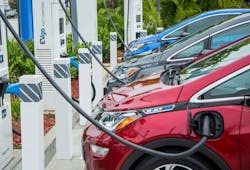What do you think of when you hear the word “sustainability?” For many years, the term, in my mind, evoked thoughts of recycling and other ordinary, everyday practices that fall under the general umbrella of “environmental friendliness.”
Separating plastic from the rest of the trash. Hiring someone to haul your scrap tires away. Disposing of used oil properly. All of those things are good, but there’s so much more to how sustainability is now defined within our industry.
Tire manufacturers are leading the charge, explaining how sustainability, as a concept, has moved beyond simply doing nice, common-sense things for the benefit of Mother Nature.
Sustainability impacts the sourcing of raw tire materials, how those items move through supply chains, how tires are designed and built and how those tires get from Point A to Point B.
Sustainability, manufacturers say, can set the stage for future product innovation and can even enhance profitability.
Sustainability, too, can give employees a higher purpose to rally around. It also can create good vibes among customers, shareholders and other parties. And not insignificantly, sustainability can attract investment.
“Sustainability is anchored in the foundation of our values,” according to Continental AG’s website.
“Sustainability is at the center of our company’s mission to realize innovations that improve the way people move, live, work and play,” says Paolo Ferrari, president and CEO of Bridgestone Americas Inc.
“Everything we do at Michelin must meet three inseparable criteria: people, profit and planet,” Alexis Garcin, chairman and president of Michelin North America Inc., recently declared. “This is what drives our sustainable strategy.”
Other tiremakers are talking openly about sustainability and how it will shape the future of their companies, as well.
Sustainability also rolls up into something called ESG, which stands for “environmental, social and governance.”
In an article published in the Dec. 26, 2020, edition of The Financial Times, reporter Michael Martin — citing various reasons — wrote that ESG “is a trend we can’t afford to ignore.”
Can you afford to ignore sustainability at your business?
According to Anne Evans, owner of Universal Strategies Ltd., a Connecticut-based trade, investment and ERG consulting company, the answer is clear: not anymore.
A third-generation tire dealer and champion of sustainability decades before it was ever cool, Evans — who also worked for the U.S. Department of Commerce for many years and has even advised the White House on supply chain matters — says you should embrace the idea of sustainability and find a way to make it work for your business.
And now’s the time to do it.
“What are the headlines we’re seeing? America going back to the Paris Climate Agreement, climate change, what we’re doing with green energy and other things — all of that feeds into what’s the hot topic currently,” Evans recently told me.
Your dealership is probably already practicing sustainability, she says. “When you look at independent, family-owned tire dealerships, the idea of responsible shareholder investment doesn’t come into play because tire dealers are their own people. But more and more tire dealers are seeing it as a social necessity to be sustainable because it’s also a regulatory necessity.
“What you do with your old tires, what you do with your oil, what you do with things that are generated during your processes — these practices are both good business and a socially beneficial thing,” she says.
But are you telling your customers about them?
Those little things you do to stay compliant with city, county and state regulations may seem mundane. But to some customers — especially younger ones, who have been bombarded with “green messaging” from an early age — these protocols could mean the difference between choosing to do business with you or buying tires from the guy down the street.
And if you’ve gone the extra mile of installing a few solar panels at your store or equipping your company’s vehicles with fuel efficient tires — all the better.
“The idea is to communicate, ‘We’re not here to just sell you a tire. We’re here to be a good steward of the community,’” says Evans.
That’s never been a bad idea. It’s now an even better one. Start tooting your horn today. Make sustainability work for you.
If you have any questions or comments, please email me at [email protected].


